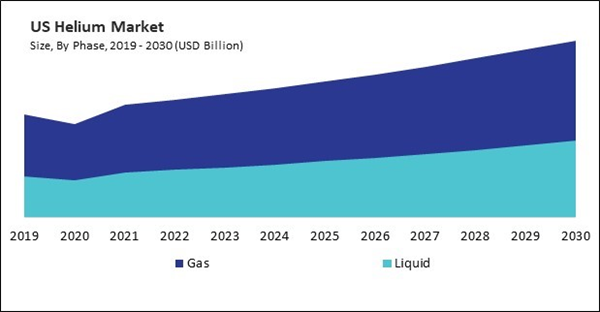Liquid helium, a crucial coolant in superconducting applications, research laboratories, and medical devices like MRI machines, is witnessing a phase marked by both challenges and opportunities. One significant aspect shaping the liquid market is the increasing demand from diverse sectors. Thus, the US market would utilize 18,454.0 tonnes of Liquid helium by 2030.
The US market dominated the North America Helium Market by Country in 2022, and would continue to be a dominant market till 2030; thereby, achieving a market value of $1,383.6 million by 2030. The Canada market is exhibiting a CAGR of 6.2% during (2023 - 2030). Additionally, The Mexico market would experience a CAGR of 6.9% during (2023 - 2030).
The use of helium in cryogenics is a major driver of the market. It’s unique properties, including its extremely low boiling point of -268.9°C (-452°F) at atmospheric pressure, make it an ideal coolant for superconducting magnets. For operational purposes, including particle accelerators and magnetic resonance imaging (MRI) machines, these superconducting magnets necessitate temperatures in proximity to absolute zero in order to retain their superconducting state characterized by zero electrical resistance.
MRI machines, in particular, rely heavily on liquid helium to cool the superconducting magnets. These magnets are used to produce a strong and stable magnetic field, which is essential for the imaging process in MRI scans. As helium is an indispensable component in MRI machines, which guarantees the precision and dependability of medical diagnostics, the healthcare industry is a significant consumer of helium.
Similarly, according to estimates by the Mexican Aerospace Industry Federation (FEMIA), by mid-2022, the number of aerospace manufacturing firms and organizations in Mexico will have increased from 100 in 2004 to 368. Presently, manufacturers, maintenance-repair-overhaul facilities (MROs), technical schools, research centers, universities, and providers of related services comprise the majority of these organizations. Overall, 79% of all businesses are engaged in manufacturing, 11% are devoted to design and engineering, and 10% provide MRO services. Foreign direct investment (FDI) by country of origin was estimated by FEMIA to have been 48% from the United States and 36% from Canada in 2019.
Based on Phase, the market is segmented into Gas and Liquid. Based on End-use, the market is segmented into Medical & Healthcare, Aerospace & Defense, Electronics & Electrical, Nuclear Power, Metal Fabrication and Others. Based on Application, the market is segmented into Cryogenics, Breathing Mixes, Leak Detection, Welding, Pressurizing & Puring, Controlled Atmosphere and Others. Based on countries, the market is segmented into U.S., Mexico, Canada, and Rest of North America.
List of Key Companies Profiled
- Air Products and Chemicals, Inc.
- Linde plc
- Air Liquide S.A.
- Messer SE & Co. KGaA (Messer Industrie GmbH)
- Gulf Cryo
- Axcel Gases
- Iwatani Corporation
- MESA International Technologies, Inc.
- Matheson Tri-Gas, Inc. (The Nippon Sanso Holdings Group)
- IACX Energy LLC (Alder Midstream, LLC)
Market Report Segmentation
By Phase (Volume, Tonnes, USD Billion, 2019-2030)- Gas
- Liquid
- Medical & Healthcare
- Aerospace & Defense
- Electronics & Electrical
- Nuclear Power
- Metal Fabrication
- Others
- Cryogenics
- Breathing Mixes
- Leak Detection
- Welding
- Pressurizing & Puring
- Controlled Atmosphere
- Others
- US
- Canada
- Mexico
- Rest of North America
Table of Contents
Companies Mentioned
- Air Products and Chemicals, Inc.
- Linde plc
- Air Liquide S.A.
- Messer SE & Co. KGaA (Messer Industrie GmbH)
- Gulf Cryo
- Axcel Gases
- Iwatani Corporation
- MESA International Technologies, Inc.
- Matheson Tri-Gas, Inc. (The Nippon Sanso Holdings Group)
- IACX Energy LLC (Alder Midstream, LLC)









